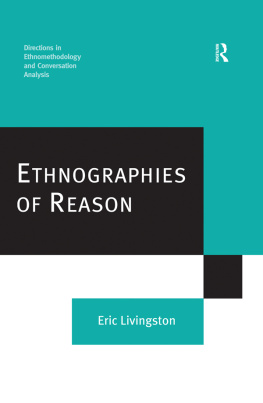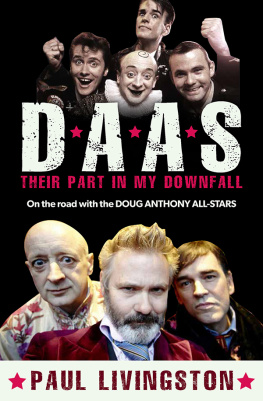Livingston - Ethnographies of Reason
Here you can read online Livingston - Ethnographies of Reason full text of the book (entire story) in english for free. Download pdf and epub, get meaning, cover and reviews about this ebook. publisher: Taylor and Francis, genre: Religion. Description of the work, (preface) as well as reviews are available. Best literature library LitArk.com created for fans of good reading and offers a wide selection of genres:
Romance novel
Science fiction
Adventure
Detective
Science
History
Home and family
Prose
Art
Politics
Computer
Non-fiction
Religion
Business
Children
Humor
Choose a favorite category and find really read worthwhile books. Enjoy immersion in the world of imagination, feel the emotions of the characters or learn something new for yourself, make an fascinating discovery.
- Book:Ethnographies of Reason
- Author:
- Publisher:Taylor and Francis
- Genre:
- Rating:5 / 5
- Favourites:Add to favourites
- Your mark:
- 100
- 1
- 2
- 3
- 4
- 5
Ethnographies of Reason: summary, description and annotation
We offer to read an annotation, description, summary or preface (depends on what the author of the book "Ethnographies of Reason" wrote himself). If you haven't found the necessary information about the book — write in the comments, we will try to find it.
Ethnographies of Reason — read online for free the complete book (whole text) full work
Below is the text of the book, divided by pages. System saving the place of the last page read, allows you to conveniently read the book "Ethnographies of Reason" online for free, without having to search again every time where you left off. Put a bookmark, and you can go to the page where you finished reading at any time.
Font size:
Interval:
Bookmark:
First published 2008 by Ashgate Publishing
Published 2016 by Routledge
2 Park Square, Milton Park, Abingdon, Oxon OX14 4RN
711 Third Avenue, New York, NY 10017, USA
Routledge is an imprint of the Taylor & Francis Group, an informa business
Copyright Eric Livingston 2008
Eric Livingston has asserted his moral right under the Copyright, Designs and Patents Act, 1988, to be identified as the author of this work.
We acknowledge permission to reproduce the poem Fortunatus the R.A. By Nikarchos, translated by Dudley Fitts, from POEMS FROM THE GREEK ANTHOLOGY, copyright 1956 by New Directions Publishing Corp. Reprinted by permission of New Directions Publishing Corp.
All rights reserved. No part of this book may be reprinted or reproduced or utilised in any form or by any electronic, mechanical, or other means, now known or hereafter invented, including photocopying and recording, or in any information storage or retrieval system, without permission in writing from the publishers.
Notice:
Product or corporate names may be trademarks or registered trademarks, and are used only for identification and explanation without intent to infringe.
British Library Cataloguing in Publication Data
Livingston, Eric
Ethnographies of reason. - (Directions in ethnomethodology
and conversation analysis)
1. Reasoning (Psychology) 2. Ability 3. Problem solving
4. Nativism (Psychology)
I. Title
153.43
Library of Congress Cataloging-in-Publication Data
Livingston, Eric.
Ethnographies of reason / by Eric Livingston.
p. cm. -- (Directions in ethnomethodology and conversation analysis)
Includes bibliographical references and index.
ISBN 978-0-7546-7106-0
1. Ethnomethodology--Research. I. Title.
HM481.L58 2008
305.8001--dc22
2008008218
ISBN 13: 978-0-75467-106-0 (hbk)

This book presents a fundamentally different, ethnographic approach to the study of skill and reasoning. It grew from a collection of studies of how people do the little things in life: work on crossword puzzles, play games of checkers, use volumetric pipettes, keep their family refrigerators in order, drive cars through four-way stop intersections, make origami models, prove theorems of elementary geometry.
From the point of view of professional sociology, these studies shared one undesirable characteristic: they really were just studies of how people work on jigsaw puzzles, play solitaire, and do physics experiments. As much as the studies might have revealed about skill and reasoning, the stories I had to tell were small stories about the ways that people do things. The larger point for and about the sociological discipline was missing.
While a totalizing narrative would have been convenient, such a perspective wasnt available to me nor did creating one make much sense. Instead, I wanted to find an emerging coherence of the studies by going deeper into each of them. Ethnographies of Reason is the result of this project. Its a study of skill and reasoning in the ordinary activities that fill our lives.
Ive written the book from the perspective of a researcher, not that of a disciplinary scholar or academic historian. Its carried throughout by the examination of always concrete case-study materials, not by theoretical arguments. After some brief introductory materials, the book begins by looking at the phenomenal domain of skill and reasoning; it then describes practical techniques for learning more about that domain; it ends with the central themes that clarify and give direction to actual research.
Ive written the book in this way, in part, because it reflects the way I work and, in part, because it may help others find their way in studies of their own. The goal isnt to make the world whole again and return us to the speculative theorizing, hypothesized empiricism, and grand narratives of traditional sociology, but to create space and to develop techniques for learning new things.
The Ordinariness of Practical Action and its Production
As an undergraduate student, my first assignment in ethnomethodology was to go and watch people queuing. After doing so for about an hour, I was tired and bored; I had seen nothing that interested me. Then something odd happened.
The last queue I watched consisted of students selling their textbooks back to the student bookstore. Three book buyers were seated at a row of tables in front of the queue. When the buyer at the right table became free, the first person in the queue needed help with her box of books. The second person in the queue placed his books on the floor and carried the box for her.
While the second-in-line was helping with the box, the buyer at the left table became free. A service bay was open, but no one was going to it. The people in the queue bunched up as a knotted congregation, no longer maintaining their queue formation. They were looking this way and that, showing each other that something was terribly wrong and asking each other through their actions, Whats going on? They had formed the questioning queue. The second-in-line returned to the queue, picked up his stack of books, and went to the open bay, whereupon the other queue members returned to their previous positions and reconstituted the line of the queue. It was magic.
Seeing this, I realized that when the queue members were previously doing nothing, they were actually doing a hell of a lot. They were watching the service bays; they were monitoring the progress of the queue. They had arranged their bodies to exhibit the line of the queue; they were maintaining the inter-queue-member distance of that particular queue. What the queue members were doing was so ordinary, and they were doing it in such an ordinary way, it seemed as if they were doing nothing. They themselves were producing the ordinariness of the queue. Their collaborative (if anonymous, unacknowledged, and uncelebrated) work of queuing had worked for them in the past. Now something had gone wrong. They all saw that their joint efforts had failed, and they wanted it fixed. In asking why?, they also wanted someonesomeone other than themselvesto go to the open book buyer.
This chapter works through three examples of the produced ordinariness of ordinary actionone involving arithmetical calculations, one concerning the play of checkers, and one regarding the local followability of a mathematical argument. The full force of the theme becomes apparent when faced with the characterization problem. An essential aspect of what were attempting to characterize is the ordinariness of domain-specific skill and reasoning to and for their practitioners: if a characterization isnt fully embedded in the ordinariness of practitioners work, it isnt what were looking to find.
At one point in my studies I became interested in the differences between the ways that computers are programmed and the ways that humans do things. In particular, I began to look at arithmetical calculations. The box below illustrates some of my personal shenanigans. Some features of this work seemed clear to me: (1) the specifics of what I do are occasioned by the particular numbers Im dealing with, arrayed in the particular way theyre arrayed; (2) if I dont use my practical techniquesif, for example, I force myself to start at the top of a column of numbers and add the numbers in strict sequential orderthe calculations become more difficult; and (3) even then, I still have my little tricks for remembering the multiplication table or for adding two numbers. These observations troubled me; I found them lacking in one particular way: since I felt that there is a definite, absolute answer to an arithmetic problem, all the practices I brought to bear on performing a calculation seemed incidental to the underlying mathematical reality. There was nothing about my practical techniques that seemed essential to the actual arithmetic.
Font size:
Interval:
Bookmark:
Similar books «Ethnographies of Reason»
Look at similar books to Ethnographies of Reason. We have selected literature similar in name and meaning in the hope of providing readers with more options to find new, interesting, not yet read works.
Discussion, reviews of the book Ethnographies of Reason and just readers' own opinions. Leave your comments, write what you think about the work, its meaning or the main characters. Specify what exactly you liked and what you didn't like, and why you think so.
















